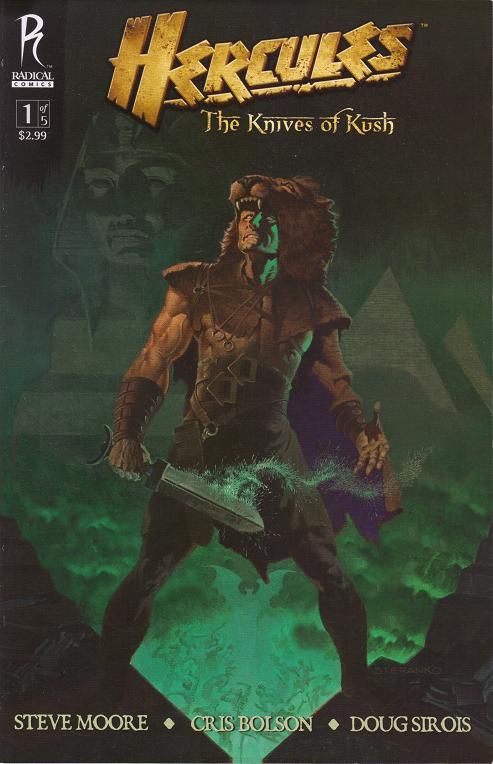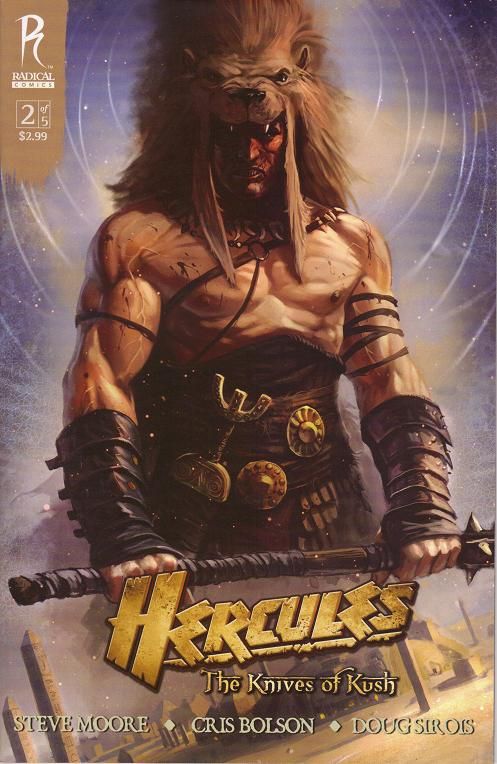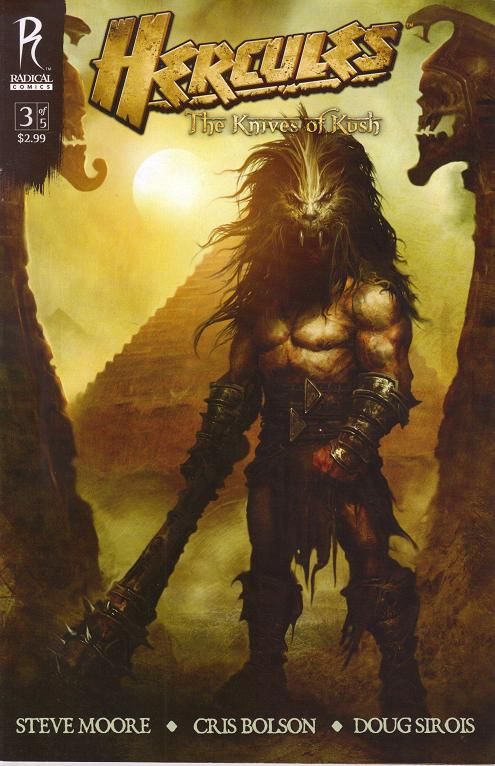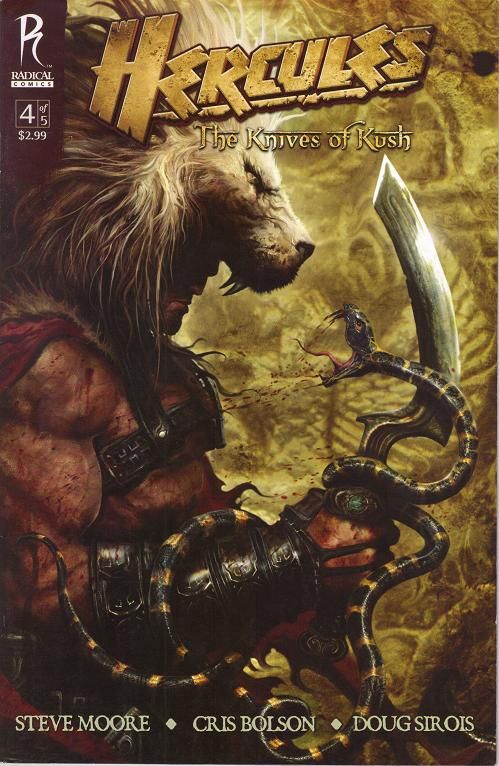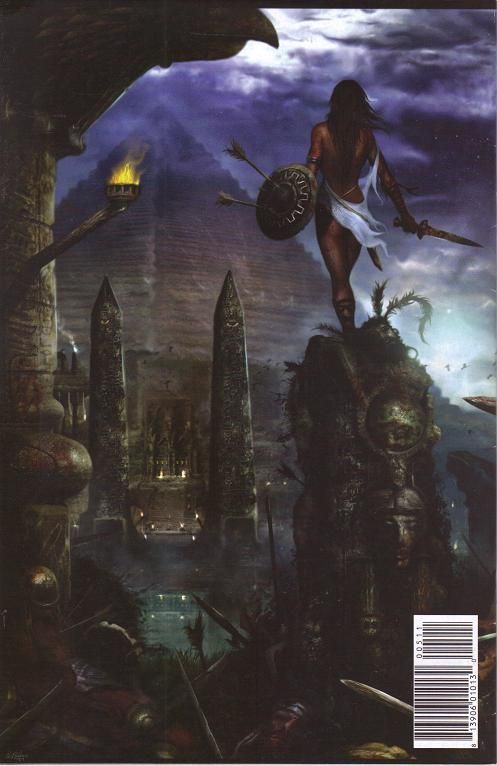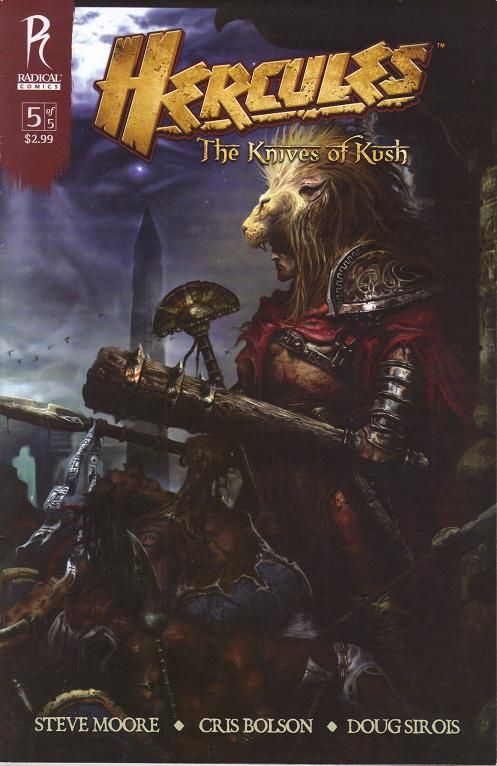No, it's not the Marvel one. It's the second Hercules mini-series from Radical, subtitled "The Knives of Kush"!
Gianluca Glazer, Director of Marketing for Radical, always sends me his company's comics, either as a .pdf file or in hard copy, and I think it's rather cool of him. I'm not entirely sure if I would have picked any of these up otherwise - maybe Hotwire, because Steve Pugh is awesome - but the first Hercules mini-series was quite good, and this one keeps it up. Let's break it down: Hercules: The Knives of Kush is a five-issue mini-series, with each issue costing $2.99. It's written by Steve Moore, illustrated by Cris Bolson (with some help on issues #4-5 from Manuel and Leonardo Silva),
colored by Doug Sirois (with help on issues #4-5 from Cliff Cramp and Steve Firchow), and lettered by Todd Klein.
At the end of Hercules: The Thracian Wars, our hero and his band of adventurers (or mercenaries, if you're feeling uncharitable) were off to Egypt to seek more fortune. That's where this mini-series begins, on a slow boat to the Delta. Moore uses Iolaus the charioteer as his narrator, which is a fine choice. Iolaus is the most sympathetic of the band, and he's the most "like us." Autolycus is a sneaky bastard, Meleager is a lovestruck whiner, and Atalanta is haughty. Hercules, as a demi-god, isn't a good choice either - he's not given to introspection, so his narration wouldn't be terribly interesting. These people are interesting to read about, and Iolaus is a good person to narrate their adventures. They are beset immediately by pirates, leading to them arriving in Egypt in somewhat worse shape than they thought they would. They rescue one of the pharoah's wives from bandits, which gets them an audience with the pharoah and a job as bodyguards for his wife. The pharoah, however, is embroiled in a civil war with his half-brother, and he wants Hercules and his group to spy on those in Memphis who might be working for the other side. And so we're off!
Moore does a nice job with the historical setting. Seti II ruled from 1203 to 1197 BC and there's strong evidence that Amenmessu was ruling in direct opposition to him in Upper Egypt. Some of the other people in the book - Chancellor Bay and Twosret, one of Seti's wives - also existed. It gives the book, which is filled with sorcery and people who wield lightning and those who speak to the dead, a nice grounding of realism.
Amenmessu is allied with a secretive cult, the Knives of Kush, whose leader, Khadis, is a sorceror who can call down lightning. So Seti needs all the help he can get in his war.
Hercules and his crew try to suss out who the traitor in Seti's camp is (everyone suspects Chancellor Bay because he's a jerk, but that just means it's obviously not him), infiltrate the Knives of Kush (and end up at an orgy) and fight against the rebel armies using tactics that the Egyptians don't trust but which work anyway. It's an adventurous book, certainly, but having Iolaus as a narrator allows Moore to undercut it a bit. This is nothing new, but Moore still does it well. Iolaus hates warfare and is even a bit cowardly, but he still does what's necessary because he's sworn to help Hercules. The Egyptians think the Greeks are barbarians and then prove that they're just as barbarous. The Greeks might be unsophisticated, but they don't engage in devious subterfuge. Moore lays on the culture clash a bit thick, but it's still a good way to highlight the ways these characters live their lives. One thing stories can always do is comment on today's society, and Moore is fairly subtle about this. The Egyptians, for instance, plan their wars out in committee, and Iolaus is wistful for the days when two groups of men simply faced each other and fought. We can read this as an ancient Greek lamenting the complicated, "sophisticated" society of the Egyptians, or we can read this as a man wondering what happened to the "good old days," which is applicable in any time. Moore is also subtle about Atalanta's lesbianism, too. She hooks up with one of Seti's wives, but it's never a big deal - the Greeks are more worried about the political implications of her affair than the fact that it's with a woman. One of the nicer moments of the book, character-wise, is when Meleager complains that Atalanta doesn't care at all about him, and Iolaus points out that's not true - if she didn't care about him, she would have killed him a long time ago.
Moore adds little touches like this throughout the book, and makes it a more interesting comic than just a high-falutin' adventure.
Bolson is a decent artist (better than the Silvas, who come on to help out later in the series), working in Radical's "house style." I'm not sure how it's created - it's lushly painted, and it often looks computer-aided, and it might put you off a bit. I've grown used to it, and if it's done decently, I don't have a problem with it. Bolson's art is a bit stiffer than Admira Wijaya's, who drew the first series, and also a bit more cartoony. It's tough to review because it lacks distinct individuality - you can say you don't like it, but Bolson doesn't have a style you can really write about it. He doesn't do anything brilliant, but there are a few nice scenes and he tells Moore's story ably. I actually wish that he did the entire series - the final two issues suffer a bit when the Silvas do the art. The coloring manages to integrate the art fairly well, but you can see the difference. The Silvas are a bit smoother and even more cartoony, so Bolson's slightly gritty art looks better by comparison.
I assume Radical is bringing out a trade of this series, and it's worth a look. If you can't wait for the trade, you can find the issues on Radical's web site. It's always fun to read a rollicking adventure comic, and Moore has a good grasp of the characters and the setting. I don't know if he has another series planned, but it would be kind of neat to see a five-issue series starring these characters every year or so.


